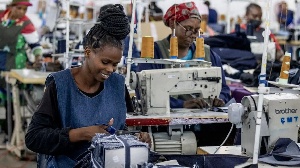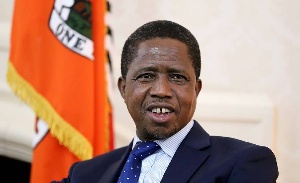Business News of Friday, 4 April 2025
Source: www.ghanawebbers.com
'Jobs are going to be affected' – Trade expert warns of fallout from Trump tariffs
Appiah Kusi Adomako, the West Africa Director for CUTS International, has raised concerns about job losses in Ghana. This follows the U.S. imposing a 10% tariff on Ghanaian exports.
He warns that this decision could severely impact local industries reliant on the American market. Speaking on Joy News’ PM Express Business Edition, he expressed his worries clearly.
“Jobs are going to be affected,” he stated. “International trade will reduce, leading to serious implications for the global economy.”
Adomako emphasized how tariffs directly affect Ghanaian businesses exporting to the U.S. He specifically mentioned those under the African Growth and Opportunity Act (AGOA).
He recalled visiting an AGOA company in Koforidua last year. This company produces garments for major U.S. brands like Walmart. With these tariffs, their competitiveness may decline, potentially leading to layoffs.
The uncertainty around AGOA's future adds to these concerns. The agreement allows duty-free access for Ghanaian exports to the U.S., but it is set to expire this year.
“It is up for renewal, but I doubt whether the Trump administration would renew it,” he said. “Even if AGOA remains, it’s unclear if President Trump can restrict Ghana’s access.”
Beyond immediate trade issues, Adomako believes this is a wake-up call for Ghana. He argues that reducing economic dependence on the U.S. is essential.
“This shows we need to build resilience,” he stated. “The Trump administration has proven that unpredictability exists.”
He urged the government to hold emergency meetings for a strategic response.
“I’m sure President Mahama and his cabinet should be having a crisis meeting now,” he suggested.
He advised against imposing tariffs on America as a solution and instead finding alternative export markets.
Mr Kusi Adomako pointed out the African Continental Free Trade Area (AfCFTA) as a viable option.
“The African market is here with minimal restrictions,” he explained.
“Exporters prefer America because they get paid in dollars.” However, exporting goods within Africa can also yield dollar payments.
He acknowledged challenges due to poor trading infrastructure in Africa.
“For instance, shipping goods from Ghana to Côte d’Ivoire often requires routing through Madrid first,” he noted.
“This happens because logistics companies are European-owned and dictate routes.”
Despite these obstacles, Mr Kusi Adomako insists urgent action is needed to realign trade policies in Ghana.
“We cannot continue relying on big-brand America,” he warned. “If we don’t act now, these tariffs may lead to a larger crisis.”











